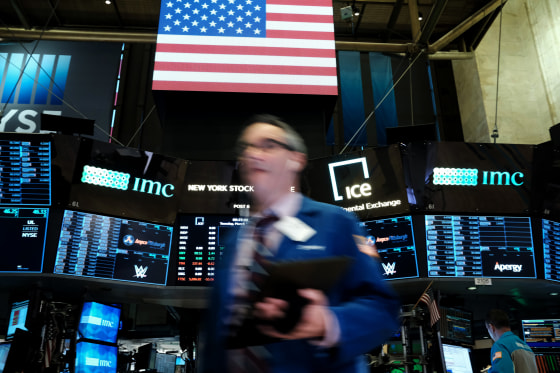The New York Stock Exchange will close its trading floor and temporarily move to all electronic trading, NYSE President Stacey Cunningham announced Wednesday.
The main equities trading floor will shut down at 5:30 p.m. on Wednesday for additional sanitization after two people tested positive for the coronavirus as part of the exchange's medical screening, Cunningham said.
"We have been informed that a member of the trading floor community and a NYSE employee have tested positive for COVID-19," said Michael Blaugrund, the NYSE's chief operating officer. "Both individuals were screened at the NYSE security checkpoint, administered a test by medical personnel at the Exchange and, as a precautionary measure, not permitted to enter the building this week. They will be treated and recuperate away from the Exchange facility."
“While we are taking the precautionary step of closing the trading floors, we continue to firmly believe the markets should remain open and accessible to investors," Cunningham said in a statement.
“NYSE’s trading floors provide unique value to issuers and investors, but our markets are fully capable of operating in an all-electronic fashion to serve all participants, and we will proceed in that manner until we can re-open our trading floors to our members."
Cunningham stressed that while the main floor is being shuttered, activity on the exchange itself will not be affected, with all-electronic trading starting on Monday.
However, as the coronavirus outbreak has worsened, and market volatility has increased, some participants are calling for a temporary halt to all trading.
The exchanges have the authority to close themselves. Typically, that would happen in coordination with the Securities and Exchange Commission, the federal agency that regulates financial markets. Most recently, they were closed during Hurricane Sandy, and after the terrorist attacks on Sept. 11.
"It's viewed as incredibly extreme, and no president, no SEC chairman, no exchange CEO wants to see it happen on their watch," says Dan Gallagher, a former SEC commissioner. "But unfortunately, it has indeed happened for various reasons in the past.”
“Markets need to be orderly,” Edward G. Greene, former general counsel of the Securities and Exchange Commission, told NBC News. “When they become disorderly, there needs to be some way to intervene to slow them down.”
Market-wide “circuit breakers” are one way to do this. On the NYSE, trading halts for 15 minutes, when the S&P 500 drops by 7 percent against the prior day’s closing. In the last two weeks, this has happened four times.
What makes this crisis different is how long it could last.
"It is so much more open-ended and vague," Gallagher says. "If you shut down the markets, what is going to be the decision point to reopen them? It is a slippery slope."
Because of that, the exchanges are looking at other measures. On Tuesday, Treasury Secretary Steven Mnuchin suggested reducing the length of the trading day.
“We may get to a point where we shorten the hours if that’s something they need to do,” he said at a White House news briefing.
That surprised Terry Duffy, the chairman and CEO of CME Group, who said the Treasury secretary had not “reached out to all cash equity and futures markets including CME Group and Nasdaq.”
“Shorter hours make no sense,” he said in a statement. “Markets are global, so shortening U.S. hours would not decrease volatility. Rather, it could actually increase as investors turn to other venues outside the U.S. when developments occur.”
Asked if the NYSE is considering a shortened schedule, a spokesperson for the NYSE said, “We remain absolutely committed to keeping the markets open and have no current plans to shorten the trading day.”
In interviews, Cunningham has talked about contingency plans that would allow the exchange to operate entirely online, but continues to resist making that move.
Greene, who is now senior counsel at Cleary Gottlieb, says Cunningham and her colleagues surely understand the gravity of their decision: “If you close it now, and it works, why would you need to reopen it?”
